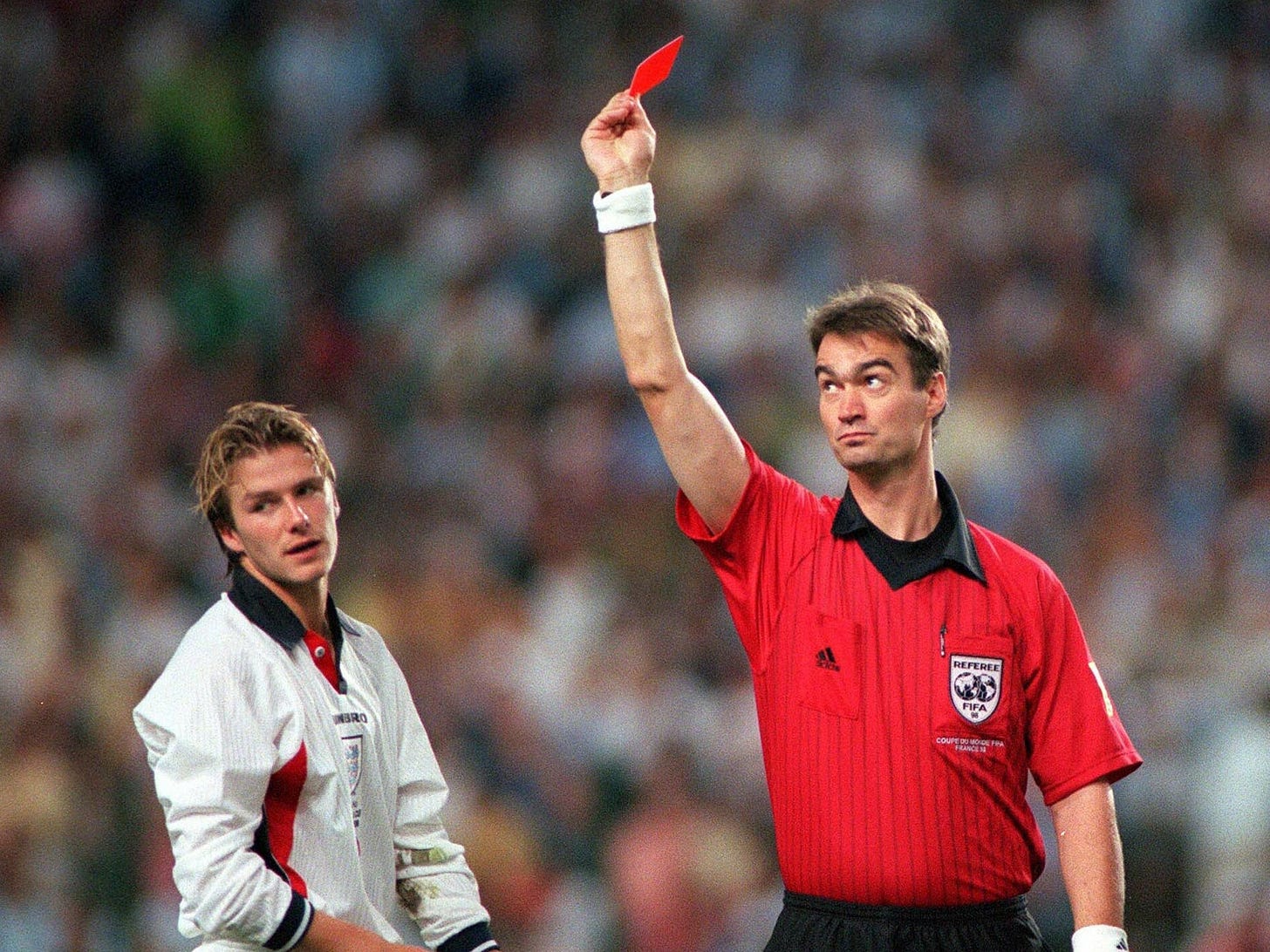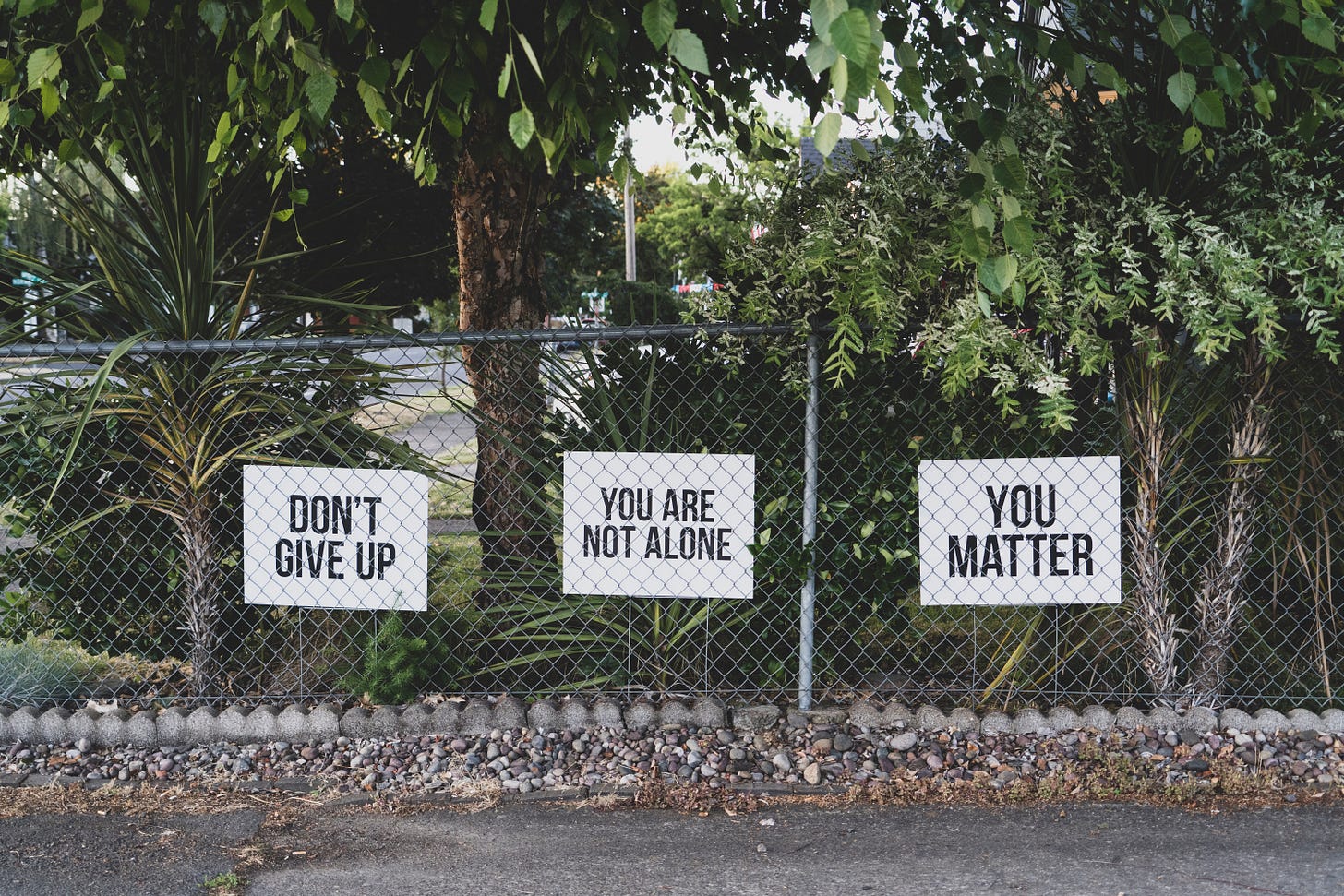A little more conversation, for a lot more action
Society talking about mental health represents progress - but we need more specificity to kee moving forward
Like many of you, I've been enjoying the Beckham documentary on Netflix - and not just because, as a massive Succession fan, Hugo is directing and asking Becks the questions. The calibre of talking heads is UNREAL. Sir Alex looks so dapper in his camelskin-coloured coat. I could go on.
Watching the "infamous kick" episode this week also highlighted what a foreign country the 90s are as a decade. The haircuts, the fashion, the St George's flag plastic hats - for a decade that feels familiar in my mind, it looks so different and so old-fashioned.
It's also shocking to look back at the hate David Beckham experienced after his red card 25 years ago. I was 18 then, so I remember it vividly - the blame was all-pervasive. With our 2023 lenses on, we'd like to think that if that happened to, say, Jude Bellingham at USA 2026, he wouldn't be subject to the same abuse.
But of course, we know he would - and that he would also be subject to the same disgusting racist abuse Bukayo Saka suffered after the Euros. We may have moved on in many respects, and Rio is correct to say in the documentary that society today would ask questions about a player's mental health were they subjected to the sustained assault Beckham faced.
But I'm sceptical about whether those questions would result in any real support. Elite sports people taking time out for themselves instead of being forced out with injury are still regarded with deep suspicion by many sections of the media and society. Naomi Osaka went through it, as did Simone Biles - we saw some similar headlines following Delle Alli's brave admission of his own emotional and substance abuse issues.
Mental health is now a much more prominent topic in the national consciousness, whether via the media, TV or advertising. But I can't escape a creeping feeling that we think all society needs to do to "solve" mental health is to talk about it and make it more prominent. Talking is an undeniably positive first step, and it is undeniable that elite sportspeople even talking about their mental health in the 90s would have been met with derision.
But I still saw too many empty gesture posts on World Mental Health Day, posts that said things like, "Our employees are encouraged to check in with and take care of their mental health". Posts that lack specificity and action, posts that tick a box on the content calendar rather than offering any tangible support or encouraging any form of action.
Perhaps it’s the slightly nebulous nature of a phrase such as “mental health” that means some campaigns and posts can be well-meaning but lack any form of impact.
I'm a realist; I know that, like other catch-all phrases like "content" and "thought leadership", using a phrase like mental health is a helpful shorthand to signal what you're talking about.
But it can't stop there - you need to explore deeper to highlight what you're thinking about and play a part in having more conversations discussing topics that can be uncomfortable.
This video from Norwich City, shared widely across LinkedIn this week, is a perfect example. If you haven't seen it, I should repeat the trigger warning included at the start of the video - and it made me cry; it's so powerful.
The video's power comes from saying a massive amount with deft economy - it's a storytelling masterclass. It's also the perfect example of why your media agency isn't always right and that sometimes videos longer than 6-15 seconds can be highly effective.
Also on the topic of getting specific about the mental health challenges facing society, is this from those super-smart people at The Pudding. Entitled “24 hours in an invisible epidemic”, it's a signature piece of interactive scrolly-web storytelling (to paraphrase the inimitable Matt Muir, from whose Web Curios I discovered this link) highlighting how pervasive social isolation is across the United States.
The data shows the stark decrease in time that Americans spend with other people, a decrease that is especially stark among "young people" (harking back to last week's newsletter, young people in this instance are the under 34s).
As The Pudding says, being alone doesn't necessarily equate with feelings of loneliness and isolation - some people get their energy from time spent alone. However, supplementary data shows that more people do feel lonelier than ever.
The Pudding article goes on to state the stark, shocking fact that "socially isolated people are 50% more likely to die prematurely", equivalent to the effects of 15 cigarettes a day. But, as with any mental health issue or mental disorder, talking about feeling lonely or isolated is hard. It is an "invisible epidemic".
As
often talks about in his excellent Substack (highly recommended and not just for dads), it is hard for people to ask for help and talk about their problems in a vulnerable way. Kevin's bravery in talking about his own parental postnatal depression has been a powerful beacon in encouraging his readers and people in his network to speak up about their struggles. We need more of that bravery, the bravery of Kevin, Naomi, Simone and Delli, to bring these often invisible, but highly specific issues into the mainstream consciousness.Issues of loneliness and depression are complex and, like many things in our modern world, well beyond simple solutions. But the first step we can all take is to have more of these open and honest conversations, whether in person or in our work - following in the lead of Norwich City, The Pudding and The New Fatherhood.
And we need to root these conversations and campaigns in specificity and challenge ourselves to move beyond a catch-all term like mental health. We can't fool ourselves into thinking that we've "solved" mental health just because World Mental Health Day is now a significant moment in media and social calendars.
It's a powerful moment in the Beckham documentary when (spoiler alert) David's stoic mask breaks, and he sheds tears about his England nightmare from 98 to 2001. Now, more than ever, we need more people to take Beckham's lead and show that it's OK to show emotion. To talk about how you're feeling. While you may feel vulnerable for doing so, it's an act of bravery that comes with many rewards. And if our brand and comms campaigns can make even the tiniest difference, we should be grasping that opportunity with both hands.







Thanks for the kind words, Mark.